
Joanne Rowling, known by her pen name J. K. Rowling, is a British author and philanthropist. She wrote Harry Potter, a seven-volume fantasy series published from 1997 to 2007. The series has sold over 600 million copies, been translated into 84 languages, and spawned a global media franchise including films and video games. The Casual Vacancy (2012) was her first novel for adults. She writes Cormoran Strike, an ongoing crime fiction series, under the alias Robert Galbraith.
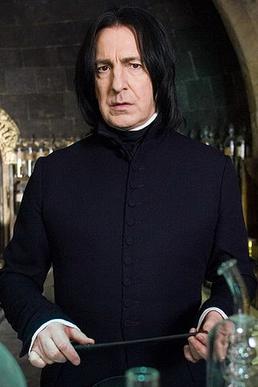
Severus Snape is a fictional character in J. K. Rowling's Harry Potter series. He is an exceptionally skilled wizard whose extremely cold and resentful exterior conceals deep emotions and anguish. A Professor at Hogwarts School of Witchcraft and Wizardry, Snape is hostile to Harry due to his resemblance to his father James Potter, who bullied Snape during their time together at Hogwarts.

Lord Voldemort is a character and the main antagonist in J. K. Rowling's series of Harry Potter novels. The character first appeared in Harry Potter and the Philosopher's Stone, which was published in 1997, and returned either in person or in flashbacks in each book and its film adaptation in the series except the third, Harry Potter and the Prisoner of Azkaban, in which he is only mentioned.
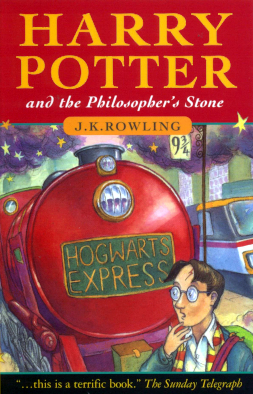
Harry Potter and the Philosopher's Stone is a fantasy novel written by British author J. K. Rowling. The first novel in the Harry Potter series and Rowling's debut novel, it follows Harry Potter, a young wizard who discovers his magical heritage on his eleventh birthday, when he receives a letter of acceptance to Hogwarts School of Witchcraft and Wizardry. Harry makes close friends and a few enemies during his first year at the school and with the help of his friends, Ron Weasley and Hermione Granger, he faces an attempted comeback by the dark wizard Lord Voldemort, who killed Harry's parents, but failed to kill Harry when he was just 15 months old.

The Order of the Phoenix is a secret organisation in the Harry Potter series of fiction books written by J. K. Rowling. Founded by Albus Dumbledore to fight Lord Voldemort and his followers, the Death Eaters, the Order lends its name to the fifth book of the series, Harry Potter and the Order of the Phoenix. The original members of the Order of the Phoenix include Sirius Black, Emmeline Vance, Benjy Fenwick, Kingsley Shacklebolt, Edgar Bones, Lily Potter, James Potter, Sturgis Podmore, Caradoc Dearborn, Alice Longbottom, Frank Longbottom, Dorcas Meadowes, Albus Dumbledore, Rubeus Hagrid, Hestia Jones, Remus Lupin, Severus Snape, Aberforth Dumbledore, Dedalus Diggle, Minerva McGonagall and Marlene McKinnon.

Harry Potter and the Goblet of Fire is a fantasy novel written by British author J. K. Rowling and the fourth novel in the Harry Potter series. It follows Harry Potter, a wizard in his fourth year at Hogwarts School of Witchcraft and Wizardry, and the mystery surrounding the entry of Harry's name into the Triwizard Tournament, in which he is forced to compete.
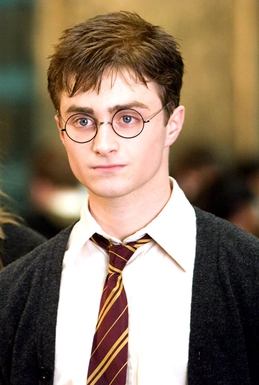
Harry James Potter is a fictional character and the titular protagonist in J. K. Rowling's series of eponymous novels. The majority of the books' plot covers seven years in the life of the orphan Harry, who, on his eleventh birthday, learns he is a wizard. Thus, he attends Hogwarts to practise magic under the guidance of the kindly headmaster Albus Dumbledore and other school professors along with his best friends Ron Weasley and Hermione Granger. Harry also discovers that he is already famous throughout the novel's magical community, and that his fate is tied with that of Lord Voldemort – the internationally feared Dark Wizard and murderer of his parents, James and Lily Potter. The book and film series revolve around Harry's struggle to adapt to the wizarding world and defeat Voldemort.
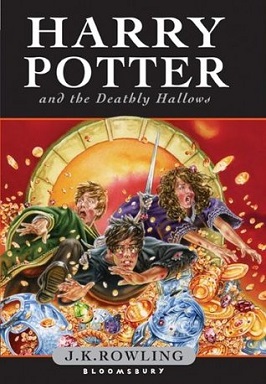
Harry Potter and the Deathly Hallows is a fantasy novel written by British author J. K. Rowling and the seventh and final novel in the Harry Potter series. It was released on 21 July 2007 in the United Kingdom by Bloomsbury Publishing, in the United States by Scholastic, and in Canada by Raincoast Books. The novel chronicles the events directly following Harry Potter and the Half-Blood Prince (2005) and the final confrontation between the wizards Harry Potter and Lord Voldemort.

Harry Potter and the Half-Blood Prince is a fantasy novel written by British author J. K. Rowling and the sixth and penultimate novel in the Harry Potter series. Set during Harry Potter's sixth year at Hogwarts, the novel explores the past of the boy wizard's nemesis, Lord Voldemort, and Harry's preparations for the final battle against Voldemort alongside his headmaster and mentor Albus Dumbledore.

Harry Potter is a series of seven fantasy novels written by British author J. K. Rowling. The novels chronicle the lives of a young wizard, Harry Potter, and his friends Hermione Granger and Ron Weasley, all of whom are students at Hogwarts School of Witchcraft and Wizardry. The main story arc concerns Harry's conflict with Lord Voldemort, a dark wizard who intends to become immortal, overthrow the wizard governing body known as the Ministry of Magic, and subjugate all wizards and Muggles.

The Tales of Beedle the Bard is a book of fairy tales by author J. K. Rowling. There is a storybook of the same name mentioned in Harry Potter and the Deathly Hallows, the final novel of the Harry Potter series.
The immense popularity and wide recognition of J. K. Rowling's Harry Potter fantasy series has led to its being extensively parodied, in works spanning nearly every medium. The franchise holds the record for the most fan fiction parodies, at over 900,000 Some self-described parodies have been targeted by Rowling and her publishers as plagiarism, while others have sold hundreds of thousands of copies without any threat of legal sanction. Misinterpretations of Harry Potter parodies have sparked at least two urban legends. Many Harry Potter parodies are self-published; others are put out as part of major comic productions, such as Mad, The Simpsons, South Park, Saturday Night Live and Robot Chicken, all of which have parodied Harry Potter several times. Rowling has also been parodied in a number of instances.

Rubeus Hagrid is a fictional character in the Harry Potter book series written by J. K. Rowling. He is introduced in Harry Potter and the Philosopher's Stone as a half-giant and half-human who is the gamekeeper and Keeper of Keys and Grounds of Hogwarts, the primary setting for the first six novels. In the third novel Harry Potter and the Prisoner of Azkaban, Hagrid is promoted to Care of Magical Creatures professor, and is later revealed to be a member of the Order of the Phoenix. A loyal, friendly, softhearted personality who is easily brought to tears, he is also known for his thick West Country accent.

Ginevra Molly "Ginny" Weasley is a fictional character in J. K. Rowling's Harry Potter novel series. Ginny is introduced in the first book Harry Potter and the Philosopher's Stone, as the youngest sibling and only daughter of Arthur and Molly Weasley. She becomes Harry's main love interest and eventually marries him at the end of the series. She is portrayed by Bonnie Wright in all eight Harry Potter films.

The Magical Worlds of Harry Potter: A Treasury of Myths, Legends, and Fascinating Facts is a guide to the fictional Harry Potter universe, written by David Colbert. It explores the references to history, legends, and literature in J.K. Rowling's Harry Potter novels. Colbert conceived the idea for The Magical Worlds of Harry Potter while quizzing his nephew and nieces about the mythological references in the novels. He later wrote the book while teaching a seminar on self-publishing to graduate students at the University of North Carolina. The book was published in March 2001, without approval from Rowling, and has since received positive reviews from critics. An updated version of The Magical Worlds of Harry Potter was published in 2004 by Berkley Books.
Barry Cunningham is a British publisher, who worked for various publishers including Penguin Books and Bloomsbury before setting up Chicken House publishing in 2000. He is most well known for signing J. K. Rowling and publishing Harry Potter and the Philosopher’s Stone in 1997.
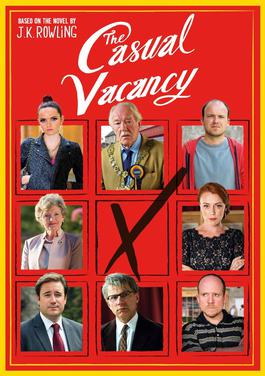
The Casual Vacancy is a 2015 British miniseries based on the 2012 novel of the same title by J. K. Rowling. Directed by Jonny Campbell and written by Sarah Phelps, the series premiered on 15 February 2015 on BBC One in the United Kingdom and on 29 April 2015 on HBO in the United States.
"Episode 1" is the first episode of British miniseries The Casual Vacancy based on the novel of the same title by J. K. Rowling.
"Episode 2" is the second episode of the British miniseries The Casual Vacancy based on the novel of the same title by J. K. Rowling.
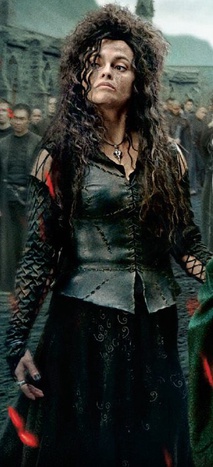
Bellatrix Lestrange (née Black) is a fictional character in the Harry Potter book series written by J. K. Rowling. She evolved from an unnamed peripheral character in Harry Potter and the Goblet of Fire into a major antagonist in subsequent novels. In the final installment of the story, Rowling established her as Lord Voldemort's "last, best lieutenant". Bellatrix was the first female Death Eater introduced in the books. Bellatrix had a fanatic obsession with the Dark Lord although she was clearly fearful of his magical abilities and absolute power over his forces. She is almost as sadistic and homicidal as Lord Voldemort, with a psychotic personality.


















